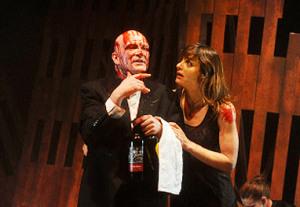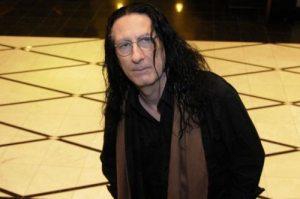
Gargolios (a.k.a. Throats) at SESC Vila Mariana
He’s ba-ack! No, not Arnold, the ex-Governator, and certainly not The Donald, either. But, oh yes, The Gerald – Gerald Thomas, to be exact, the bad boy of Brazilian, American and European theater, and the uncrowned “Prince of Puns.”
After a nearly nine-month long hiatus, brought on by his near mental and physical exhaustion, along with his annoyance with contemporary theater as a whole, the multi-talented (and multi-national) playwright, producer and stage director has returned to peak avant-garde form by giving “birth” to (what else?) a controversial new stage vehicle wherein his 9/11 demons are finally confronted and – it is to be hoped – exorcised for all time.
The work in question is the tantalizingly titled Throats – and what a piece of work it is! To begin with, there’s a superbly realized crucifixion scene (with, of all things, a few reverential nods to Monty Python’s irreverent Life of Brian) set in, of all places, the ruins of the World Trade Center Towers. There’s also a recreation, if that’s the right word, of the Last Supper (!), which Thomas turns into an oral and visual free-for-all; what The New York Times once referred to as “verbal hemorrhage,” and what Thomas calls meta-language, i.e., something beyond mere words.
There are hints as well of past stage triumphs, particularly in the disembodied female head resting on the supper table, a disquieting and totally unexpected allusion to his classic Empire of Half Truths, with actress Fernanda Torres, from the early 1990s.
So what does it all mean? Fresh from a six-week-long run at the Pleasance Theatre, in a secluded London suburb that can only be described as off-off-off-Broadway – about as far from Manhattan’s “Great White Way” as one could get, and from the UK’s own West End play district – here is The Great Man himself, uncensored and uncut, verbally hemorrhaging in his own inimitable fashion, to shine a lone spotlight on his latest extracurricular accomplishments.
Josmar Lopes – Welcome home, Gerald! Are you glad to be back in the Big Apple?

Gerald Thomas
Gerald Thomas – Am I glad? Joe, I suffer every single day when I don’t wake up with the noise and the smell of this town. You gave me a great intro – for which I’ll be eternally grateful. Do I deserve it? I’ll tell you, there’s always reason (of some kind or another) to moan and groan. But coming home this time was particularly hard because of Ellen Stewart’s death [the late founder of La Mama Experimental Theater in Greenwich Village, who passed away in January 2011].
JL – Yes, I was so sorry to hear about her passing. It was an especially hard blow for you, I’m sure, since you two were so close. Your Blog tribute to her was very moving. In his column, New York Times’ drama critic Ben Brantley paid her a wonderful compliment for her years of devoted service to up-and-coming artists (such as yourself) and quite a few others besides.
GT – I was going to come back for the service, etc., but Throats was a very demanding rehearsal process (not entirely to my satisfaction). Still, I felt that I should, could and did cry my guts out when I learned of her death; but she would have been proud of me, keeping my troops aligned and not skipping rehearsals.
Coming back to being in New York: I can sit for hours looking at the barges and boats and bigger ships, float along the East River, where I live. And being back here is almost like being born again because of U.S. politics, my prime interest. You cannot imagine the torture of being stuck with the BBC News revolving [around] the same old and utterly boring stories all day, all night, until dizziness takes over.
JL – There’s never a dull moment here, that’s for sure! You took a well-deserved break from the theater. Why did you leave it and what brought you back?
GT – I left it because I really had had enough and felt that we (the theater people) had lost ground to a generation of nerds and idiots who Blog, tweet, and text-message each other ABOUT NOTHING, while their ears are covered, insulating them from the realities of the world: them and their iPods, iPads, I-this, I-that. Why did I come back to this craft? Don’t know. Show me evidence that I did.
JL – Well, for one, your newest play Throats is ample evidence of that. What made you decide to stage it in London instead of in the Village, or in São Paulo, for that matter?

Angus Brown & Maria de Lima
GT – London is where I learned to be an adult, it’s where I had my first child, it’s where I rented my first apartment and dealt with electricity bills, etc. It’s where I sat, for six years, and studied at the British Museum. Also, what needs to be considered in this equation is that London’s theater scene is amazingly conventional. They are politicized, they deal with Agitprop Theater, but nothing metaphorical or imagetically evocative ever had any ground to hold in London. It took Pina Bausch thirty-odd years to make it across the [English] Channel, and the same goes for [stage director] Bob Wilson. I, though, well, if my return was to be a Parsifal – like proof that I could grab the Holy Grail – then I made it as difficult as possible for myself. And now, after the closing of the play, I was proven right.
JL – Nevertheless, this lengthy “gestation period” did give rise to another vintage Thomas creation. This piece, Throats, has garnered its fair share of criticism, both pro and con.
GT – A fair share of criticism. Indeed. And I must confess that I like all this much ado about nothing. I mean, look at the world. Look at all the shit that’s flying around here in the U.S., with the GOP gaining terrain, with [billionaire investor] Donald Trump saying (and getting away with) outrageous claims. Still, people worry about what happens on a stage, or on a canvas, or on some sort of manifestation regarding the arts.
JL – Can you tell me what your play is about? And what is the significance of the title?
GT – Now, I can tell you that Throats isn’t about anything. What does that mean? It means that the same chaos I witnessed on September 11, 2001, in the hole, i.e., the banquet in hell I witnessed, day in, day out, with firefighters, NYPD, police from all over, the Army, etc., all covered in dust and asbestos, burning in hell (all of us, burning in hell), yet trying to sit and have some sort of a meal. I was one of those who served the meals.
JL – A tragic irony, one that you deliberately touched upon in your play. It must have been a true hell on earth for anyone who was there…

Gerald at his desk
GT – Is the play coherent with real events? No, of course not. I take that as a departing point and from there my mind is free to associate and all kinds of thoughts come to mind. And when they do, they need to be staged.
JL – Indeed they do. And much of your work – in fact, I’d say a great deal of it – tends to be autobiographical in nature. This one appears to be no exception.
GT – Precisely. Throats is no exception.
JL – I read that you’re planning to take the play to Brazil. How soon will that take place?
GT – This is my biggest headache at this moment. Touring a play is a nightmare. Some countries can be more nightmarish than others.
JL – Nightmarish in what ways, Gerald?
GT – Speaking logistically, São Paulo is quite extraordinary when it comes to organization. SESC [Serviço Social do Comércio – Business Social Service] is one of the best, best organized cultural institutions that I’ve ever been part of. But Munich is chaotic. Most of Austria is chaotic. Not to mention Argentina, one of my favorites, but where the main theaters (such as Colón, San Martin, and so on) sometimes DO NOT have electricity and all [the] lights go out during the show. It hasn’t only happened once but almost during every single tour: around ten times or more.
JL – I rather enjoyed journalist Silio Boccanera’s thought-provoking interview with you (it’s featured on your Blog). In it, he mentioned your works as having a strong affinity with those of the late, great Brazilian playwright Nelson Rodrigues. Do you agree with that analogy?
GT – Did he say this? I’ll have to take another look at it. I liked talking to Silio. His knowledge and “twisted take” of the world is amazingly interesting. The interview was deep and took a long while (which, for TV, is amazing). The editing, as far as I can remember, is extremely well done.
But Nelson Rodrigues? I remember saying that I find Nelson’s work one of the best in drama History. I do remember that Professor David George does make that comparison in his book, The Flash and Crash Days, named after my 1991 play [starring celebrated actress Fernanda Montenegro].
JL – Have you ever considered staging any of Rodrigues’ plays?
GT – Would I like to? I tried, but the family denied me the rights. That was back in 1986. So, instead of insisting, I just decided to go and write my own piece, Eletra Com Creta (much encouraged by Philip Glass, who said: “Fuck ’em”).
JL – And that settled that. Speaking of staging, how did you find this latest incarnation of the Dry Opera Company? Was it “up to snuff” and how does it compare to the troupe from Rio and São Paulo?
GT – I’m laughing here. Cocaine addicts would ask: “Was it up to sniff?” Look, Joe, I honestly wouldn’t know how to compare companies. I mean, each one of them come with their own “master” personality and grade of professionalism.
If I go back in time and take the Danish Dogma Company, for which I wrote and directed Chief Butterknife or the Italian Grotowski Company, for which I did The Said Eyes of Karlheinz Öhl and the Great Jones Company here at La Mama, how could I possibly compare them?
I mean, I’m sick and tired of saying that Brazilians and the Polish are the best actors in the world. All of this is B.S. Each country produces marvelous actors. So, no comparisons.
JL – Getting back to Silio’s interview, there was a point near the end where you dropped to all fours and pulled a patented Thomas tantrum – all in good fun, I’m sure. With that bit, though, you completely won Silio over. In fact, you charmed the pants off him! I remember seeing you do something similar at a 2008 rehearsal in São Paulo (during Kepler the Dog, I believe). Is this another case of a frustrated actor taking out his frustrations on the observer?
GT – No frustrations, believe me. I mean, I could simply write a part for myself in all these works but choose not to. Silio made me climb a steep hill in a steep park named Primrose Hill. And climbing, breathing and trying to be intelligent all at once does not work. I was exhausted (it was the third day of being interviewed) and I thought they’d cut that scene out in the final cut. But I made Silio smile and that’s what counts.
Did I do a similar thing in Kepler? Where? Honestly, I do not remember. I do remember playing the electric guitar…
JL – You were banging your head on the wall and pounding your fists on it as well. It was a marvelous performance, better than some of the actors! And as far as the electric guitar, you were playing Led Zeppelin.
GT – You’re talking about that one rehearsal you attended with your family. Well, yes. Many rehearsals turn out to be that way. But no fisting (LOL) this time.
JL – You’ve been working lately with some well known artists. I’m thinking of John Paul Jones, ex-bassist for that same rock group, Led Zeppelin. It’s been rumored you and Jones are working on – dare I say it – an opera? Tell me a little about that project.
GT – Our latest decision is to make [Swedish playwright] August Strindberg’s Ghost Sonata into an opera. That was John’s idea. And I quite like the plot, the surreal craziness, etc.
JL – Didn’t Jones also do the score for Throats?

Gerald Thomas on guitar
GT – Yes, he did. Picked each piece of music and/or agreed with my choice and composed four new pieces, amongst which a ten-minute-long piano solo which, unfortunately, did not make it into the play in its entirety.
JL – Weren’t you also working on an operatic adaptation of the life of Ernest Hemingway? And weren’t you dealing with his grandson, John Hemingway?
GT – I was, yes. I mean, years ago.
JL – Whatever happened to that venture?
GT – I still love the idea, simply because Ernest Hemingway’s life was such a fantastic representation of the (so-called) American Male! Yet, projects do get lost, get trashed or are forgotten. John (Hemingway) and I did not find a way to continue working together. It is a pity, in retrospect.
JL – Why the sudden interest in writing and/or producing-directing original operas? Is there a special place in your heart for that art form, or is it just another artistic challenge for you at this stage in your career?
GT – What else are we here for? I mean, us, the artists? If not to fast forward History or, at the very least, tell our story or a story that matches our times? Why always rely on the classics? What’s the point? What I’m telling you now hasn’t changed (in my persona): if, say, fifty years from now, they were to study our era, what will they find? A bunch of people doing Shakespeare, a bunch of people staging Wagner, and so on. That is all okay. There is – definitely – a place for that. But I don’t consider it my mission.
JL – You make a good point. Are there any plans in the near future to do anything from the standard repertoire? In other words, has Bayreuth or Salzburg come calling yet?
GT – I’ve been in touch with Bayreuth so many times… I was actually there, invited by Wolfgang Wagner, in 1988. I sat in his grandfather’s wooden chair overlooking the stage, through a weird, small wooden window.
JL – As a die-hard Wagner fan, I’m envious.
GT – Several years passed but, somehow, the projects never fit my idea of provocation and vice versa. We’re still in conversation nowadays (with the two great-granddaughters), twenty-something years later. But I seriously do not consider my role as a director all that important. As for Salzburg, I believe that Ghost Sonata will open there. Not sure.
JL – Moving on to another area, you’ve ventured recently into independent filmmaking. What has become of that project? Is it still on the back-burner or is there a chance we might see a genuine GT production on the big screen?
GT – Yes, film. I’ve been toying with the idea since forever. I mean, that group in Denmark became the so-called Dogma 95. So, in other words, I did witness and encourage, and even inspire, the birth of a film movement, which had strong ties to Rules and Regulations about how a movie had to be shot. This included a certain dogma (no pun intended) and lots of fake shots – verified years later.
But it has inspired me to work on Ghost Writer – later [changed to] Copywriter. Since film is an extremely industrial process, I’ve needed the help of people like [British director] Hugh Hudson and other filmmaking friends to tell me how important a crane shot is and a steady cam and this and that. Well, guess what happened: the script itself became a secondary thing and I deflated like a flat tire running over a bed of nails.
JL – That in itself is a very cinematic description you just gave.
GT – But still, the script is in the works and so is the funding and – in Goethe’s words – I just hope that one day this shape takes form (or vice versa).
JL – So, on the whole, was the cinematic experience all it’s cranked up to be?
GT – I don’t find it any more amusing than driving along the New Jersey Turnpike.
JL – Which is not amusing at all, I hear. Did you work with film director Fernando Meirelles (City of God, The Constant Gardener) on this project?
GT – And [on] Blindness… He based a character of one of his adaptations of Slings and Arrows on me and called this character “Oswald Thomas” (a hysterical theater director who only quotes and quotes and cannot relate to humans). [It] turned out to be a good thing because it brought us close. He did look at the script, as did Braulio Mantovani (his screenwriter), and they did collaborate, yes.
JL – Did you know that his company, O2 Filmes, was also involved in the Oscar-nominated documentary Waste Land (Lixo Extraordinário), and that Meirelles was its executive producer?
GT – No, I didn’t.
JL – I guess the screen world is fast becoming as insulated a place as the theater world is. Waste Land is mainly about Brazilian-born artist Vik Muniz and his involvement in bettering the lives of the catadores (“garbage pickers”) of the Jardim Gramacho landfills in Rio de Janeiro. You were always much involved in social causes. I’m thinking of your years as an ambulance driver in London and, without a doubt, your heroic efforts after the 9/11 attacks.
GT – You’re missing what is perhaps the most important “militant” period of my life, social, political and everything else: the years spent in London, in the 1970’s, working in the International Secretariat of Amnesty International. My God! What a period that was: I worked on behalf of Chilean, Argentinean and Brazilian “prisoners of conscience.” Thousands killed for having expressed themselves. A Holocaust of sorts.
JL – With your busy schedule, Gerald, where do you find the time to dedicate yourself to these activities?
GT – Listen, there’s always time. If one can’t “wing it” during the day, there’s the night, and if there isn’t one just has to prioritize and sometimes, often enough, those social causes are MORE important than this self-centered thing called art.
JL – There appears to be mounting interest in all things Brazilian, due in part to the country playing host to the 2014 Soccer World Cup and the upcoming 2016 Summer Olympic Games in Rio, as well as to its revived economy. Because of this renewed interest, would you be willing to spend more time in Brazil?
GT – No. Especially because of the events you just mentioned. If there is a thing I like about Brazil it’s its ingenuity in having become a great isolated, self-contained and completely independent nation. They seem not to need anyone: they get fed by the novellas [TV soap operas]; there is a popular culture (MPB – Brazilian popular music), which nourishes itself. Is that a virtue or a defect? I find it a virtue when a country’s identity can be so strong that they can feed off one another. Brazil’s so-called “internationalism” is nothing but banging on the exotic stereotype and I’m certainly not interested in that.
JL – Where do you consider your base of operations to be: London, New York, or somewhere in Germany?

Gerald in Brazil
GT – I don’t know. Good question. Actually I do know: it’s New York. I don’t really keep stuff anywhere else. It’s all here. It has always been here. Since the OpEd Illustrating days [at The New York Times] to the first Becketts, it has all been here. This is where the texts get written. Of course, I may later change them entirely or cut and polish. But it’s all here. Always has been.
JL – What needs to change in Brazil for you to move back there on a more “permanent” basis? Has the climate for the arts improved any since you’ve been away?
GT – Gosh! You seem to insist that I go and stay in Brazil. Is that because you want me out of your way? Am I weighing too much here in N.Y. or in London? Just kidding, of course. But if you, yourself, were so keen on Brazil, you’d have gone and stayed, right? But you didn’t. It’s really not about Brazil. I could easily move to Amsterdam, but it’s not about Holland. I could… you got the idea.
I HATE being a foreigner and I simply HATE the false intimacy and false friendships that Brazilians put to you on a silver platter. That is an ingrained and intrinsic problem with that culture that I simply cannot get used to. Never will.
JL – Gerald, what is there on your professional horizons, now that you’ve come back in full force?
GT – Maybe today is not a good day to do my own predicting or forecasting. Maybe the air has, indeed, run out or maybe I need a break far longer than the one I got and visit places I have never been to, such as Africa, for example. I don’t know. I’m exhausted. The new book is out (Nada Prova Nada – “Nothing Proves Nothing”) and I should be jumping with joy. But I’m not. Should President Obama get reelected, I’ll promise to be a happier camper. That’s my real ONLY worry at this moment.
JL – I hear you. I’m looking forward to this latest burst of activity on our part. Thanks again for sharing and good luck in all your future endeavors.
GT – It’s always a pleasure. Always.
(Author’s note: Throats was subsequently re-worked and rewritten by Gerald. Re-staged in São Paulo during the month of July 2011, at Teatro SESC Vila Mariana, he renamed his play Gargolios. The title is a mixture of Portuguese with English, specifically the words “gargoyles” and gargantas (or “throats”). It’s just like Gerald to use verbal puns at every opportunity. And since President Obama did get reelected in November 2012, we’re still waiting for that “happier camper” to materialize… and waiting… any day now…)
Copyright © 2012 by Josmar F. Lopes

